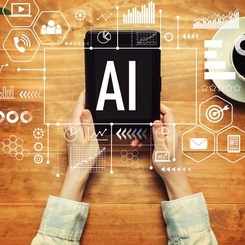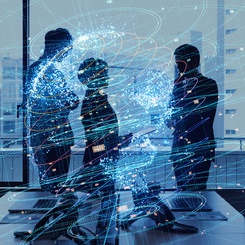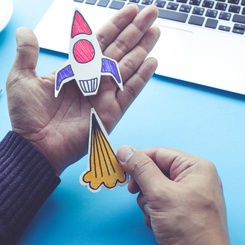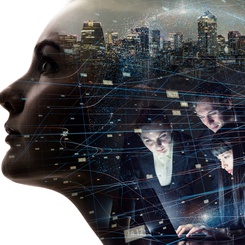We live in a world of experience. As people are increasingly always on - always connected, they are looking for experiences that are relevant and personalized for them, in the moment. Whether as a consumer, citizen or worker, people expect experiences made for them and delivered instantly. Artificial intelligence enables and accelerates every organization’s ability to shape this new dynamic.
Let’s take a couple of examples. A cruise company, Carnival, is using AI to offer its guests a uniquely personalized experience from before they even board a ship to the moment they disembark. AI acts as a brain that anticipates what guests want and need and then coordinates all Carnival’s people and resources on-board to deliver uniquely personalized experiences for everyone. Or look at the Albert Einstein Hospital in Sao Paulo. Here, AI is managing patient flow from initial consultation through to admission and treatment. The result? Transformational levels of efficiency and improved care.
Transforming experiences everywhere
AI has the potential to transform the end-to-end processes of any organization. It can offer more accurate demand prediction, automate the supply chain and deliver more efficient and personalized customer service. By harvesting and analyzing ever-greater volumes of diverse data from a growing range of sources, AI is completely changing the experience of users, customers, employees and the wider society.
So what do we mean by a great experience? It has a number of key dimensions: personal, trusted, natural, intuitive, predictive, focused, immersive and even beautiful. AI enables these qualities through its ability to deliver personalization at scale. It can tune into and predict individuals’ intentions, preferences and behavior. That enables natural and intuitive experiences, optimized to an individual’s specific context and needs.
AI = outperformance
Organizations exploiting AI’s potential outperform their competitors. Accenture’s France Future Systems Research report shows that the top 10% of companies surveyed were more likely than the bottom 25% of performers to have adopted AI early and to have developed expertise in AI.
Accenture research shows that companies that have effectively embraced AI achieved nearly triple the return from AI investments than companies that have yet to embrace the equivalent technology. Organizations that are deploying AI at scale are seeing transformational change across their business, from demand prediction, to automated supply chains and superior customer service.
A new age of customer experience
AI’s impact is already clear for today’s consumers, who expect experiences that are “always on, always me”: personalized, instantaneous and available at all times.
Around the world, AI is helping businesses meet those demands. How? By constantly drawing on and analyzing data from millions of interactions. The resulting insights enable organizations to adapt around the evolving needs of their customers and offer them relevant experiences, in the moment. Avianca Airlines, for example, has developed a chatbot to reduce their response time to customers. Spotify uses AI to tailor music recommendations according to a user’s listening history. McDonald’s and KFC are developing the use of AI to predict orders based on a customer’s previous purchase habits.
And AI doesn’t just improve existing customer services: it also creates entirely new ones. In the beauty industry for example, Shisheido uses AI to provide its customers with personalized skincare recommendations – all based on a selfie. The consumer uploads a picture to the company’s Optune app and AI does the rest. It examines the picture and combines that analysis with data about the external environment and the individual’s health and mood to create a uniquely personalized experience. L’Oréal employs AI and augmented reality in virtual try-on services to push makeup and hair color products, using technology from its recently acquired company ModiFace.
A revolution in public services
Businesses are at the forefront of AI development and adoption. But governments are also recognizing AI’s potential to transform the experiences they create and deliver. The US Department of Defense, for example, uses AI to help plan deployments during crises, while NASA employs bots to aid in its finance and procurement processes.
In the near future, AI will improve an even wider range of public services and change how people live. It will help public healthcare practitioners to predict illness and create personalized and preventative treatment plans for citizens. New autonomous mobility solutions could transform public transport infrastructure, making it more efficient and cheaper to run. And AI can help elderly people vulnerable to loneliness to interact and share their experiences.
So in every sector and in every sphere of life AI is changing the art of the possible. Exciting? Yes. Challenging? Undoubtedly. But no-one can avoid the impact of what AI brings. This is no longer an issue for the future. AI is real and happening today.
This article was co-written with Jean-Pierre Bokobza, Senior Managing Director, Accenture









